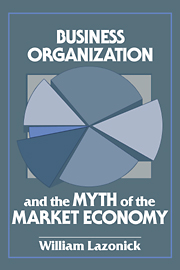Book contents
- Frontmatter
- Contents
- List of figures
- Acknowledgments
- Introduction: the wealth of three nations
- PART I Economic institutions and economic performance
- PART II Intellectual foundations and intellectual constraints
- PART III The “marvels of the market” versus the “visible hand”
- PART IV Overcoming intellectual constraints
- 8 Business organization and economic theory
- 9 Rigor and relevance in economics
- Index
8 - Business organization and economic theory
Published online by Cambridge University Press: 01 April 2010
- Frontmatter
- Contents
- List of figures
- Acknowledgments
- Introduction: the wealth of three nations
- PART I Economic institutions and economic performance
- PART II Intellectual foundations and intellectual constraints
- PART III The “marvels of the market” versus the “visible hand”
- PART IV Overcoming intellectual constraints
- 8 Business organization and economic theory
- 9 Rigor and relevance in economics
- Index
Summary
Historians and economists
Oliver Williamson's misuse of Alfred Chandler's historical research makes it worthwhile to repeat Joseph Schumpeter's position, quoted at the beginning of Chapter 4, on the importance of historical perspective for economic analysis: “Nobody can hope to understand the economic phenomena of any, including the present epoch, who has not an adequate command of historical facts and an adequate amount of historical sense or what may be described as historical experience.” What a historian like Alfred Chandler possesses that an economist like Oliver Williamson lacks is an understanding of the process of historical change. Without an “adequate command of historical facts and an adequate amount of historical sense,” it is impossible to comprehend the dynamics of capitalist development.
But, it might be argued, progress in the social sciences requires an intellectual division of labor. Williamson is an economist, not a historian. It is fair to say, moreover, that, in conceptualizing such phenomena as bounded rationality and opportunism and recognizing the importance (if not the substance) of asset specificity, Williamson has taken his version of economics well beyond the conceptual bounds of prevailing orthodoxy. No doubt it is this attempt to create a conceptual framework for analyzing the choice of organizational form that won Chandler's praise of Williamson's book. As Chandler put it in another context, his own scholarly approach seeks to determine “how the historian can take what he needs from the concepts of the other disciplines without in any sense being captured by them.”
- Type
- Chapter
- Information
- Business Organization and the Myth of the Market Economy , pp. 265 - 302Publisher: Cambridge University PressPrint publication year: 1992



